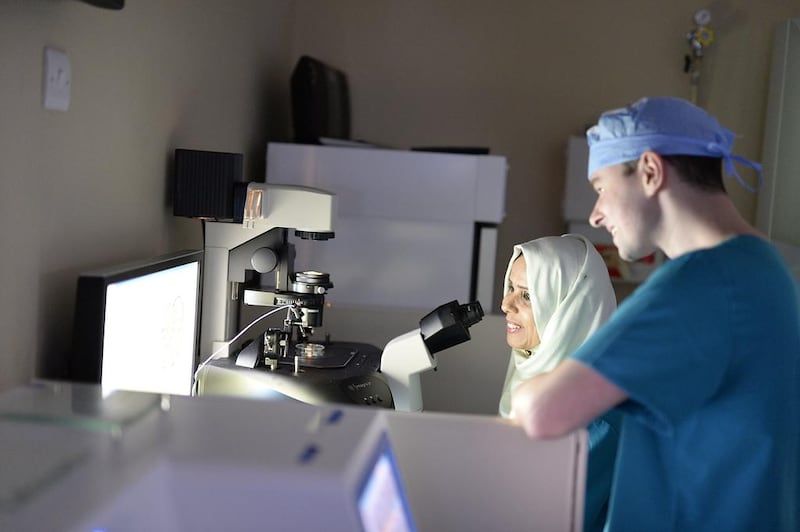Obesity, diabetes and marrying in later life is leading more couples to experience problems conceiving a child, medics have said.
Those factors have contributed to an overall drop in fertility rates, while greater opportunities for women and changing attitudes about family sizes are seeing fewer children born per family.
Clinics and hospitals that specialise in helping couples conceive spoke about the challenges, after fertility issues were identified in the Department of Health annual statistics report last month.
One major centre said it has seen a four-fold increase in the number of couples looking for in-vitro fertilisation (IVF) treatment between 2009 and 2017, prompting it to open additional branches in Dubai.
And a 2016 study by Aster DM Healthcare found one in five couples in the UAE face fertility issues, predicating that Dubai couples seeking treatment annually will almost double, from an estimated 5,975 in 2015 to 9,139 by 2030.
Obesity and smoking, for example, affects the quality of sperm in men, while having children later in life, often due to career opportunities or later marriages, reduces the chances of conceiving in women.
Dr Walid Sayed, medical director and reproductive medicine consultant at HealthPlus Fertility, expects that without intervention and better awareness about the issue, the rates of couples being unable to conceive will only increase.
"More and more people are unable to conceive spontaneously because of unhealthy lifestyles, unhealthy eating habits, obesity, diabetes, smoking and a lack of physical activity," he said.
____________
Read more
[ Abu Dhabi health survey paints grim picture as lifestyle diseases take their toll ]
[ Doctors warn against cut price IVF treatment ]
[ You get what you pay for when it comes to IVF, doctors say ]
____________
In 2009, Dr Al Sayed said, his facility carried out 800 cycles of IVF.
By 2017, this had increased to 3000.
"We see couples from as far Kalba, Fujairah, Ras Al Khaimah and from all parts of the UAE," he said.
To meet this growing demand, his clinic will open another branch in Dubai this year.
Dr Al Sayed expects demand for IVF to increase even further.
"Without proper intervention and awareness, more and more couples will be unable to conceive and we can measure this by the increase of the number of infertile couples that we are seeing at our clinic," he said.
According to the Dubai Annual Health Statistical Report for 2016, published by the Dubai Health Authority, the total fertility rate (TFR), or the average number of children a woman would have during her reproductive years, in the emirate was 5.2 per woman for Emiratis and 1.7 for expat women.
Nationwide figures from the Department of Health show the 'total fertility rate' has declined from 4.4 to 1.8 per woman between 1990 and 2013.
Dr Human Fatemi, a specialist in reproductive medicine at IVI Middle East Fertility Clinic, which has 71 branches, said medical breakthroughs are helping couples that do find themselves unable to conceive naturally.
“Infertility is becoming increasingly common not just in Dubai and the UAE but the rest of the region as well, and prompting couples to seek medical assistance to help them with their reproductive concerns is becoming more and more imperative. “Thanks to the great progress made in technologies and research globally, assisted conception procedures are more sophisticated and advanced. The success rate in the region as well as globally is high and we expect it to further improve as the world continuously works on finding breakthrough treatments to address a myriad of fertility problems."
Declining birth rates “might be attributed to urbanisation, delayed marriage, changing attitudes about family size, and increased education and work opportunities for women”.
He also said "vitamin D deficiency, obesity and marriage between first cousins, delay in conceiving, stress at workplace, lifestyle diseases, cost of living and many other social factors," also contribute.
But more couples are asking for help.
“Years ago, when couples found out they had fertility problems, they just kept it to themselves," he said.
"In our opinion, couples with infertility should see a doctor sooner rather than later; after a year of trying to conceive without success if the woman is under 35, after six months if she is over 35, and after three months if she is over 40.”
IVF is costly and often not covered by medical insurance.
Some clinics can charge as much as Dh45,000 for a single cycle of IVF treatment, and several cycles are often undertaken to increase the chances of conceiving.






